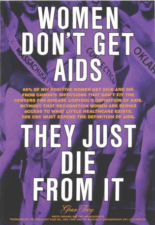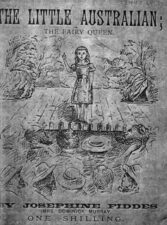
A Letter to the Editor of the Kalgoorlie Miner 1915[1]
Jean Beadle [2]
‘Notwithstanding the fact that the First Labor Women’s Conference, held in 1912, carried a resolution favouring notification and segregation of persons suffering from venereal disease, I am opposed to the compulsory clauses contained in the amending Health Bill now before the Legislative Council. I was opposed to the methods then advocated by the delegates to the conference, though just as anxious, and I trust, equally sincere, as other delegates that some effective action should be taken to cope with the evil and prevent its spread. Never have I believed that it is in the interest of morality to allow venereal disease to flourish unchecked, nor have I ever thought that prudery, mock modesty, or secrecy, could, or would, accomplish anything effective.
For many years I have studied the question from various standpoints and have discussed it with men and women in private and open conference, composed of men and women, proving my oft repeated contention that I considered the subject was one of public interest and a problem that could only be solved by men and women imbued with the highest ideals of health and morals.
With reference to the other resolution carried at the same conference viz., that sex physiology be taught in our State schools, etc., I am thoroughly in accord with, and have advocated the principle and worked for this particular reform years before it was brought before this conference, because of the conviction that the intellectual and moral training of our boys and girls on sex questions, which will help them to realise that each organism is sacred, and is, in a sense, the trustee only of the spark of life, will do more for the prevention of this disease than any other means, and in my opinion is more logical than applying compulsory methods later in life.
I desire to congratulate the Hon. Mr Underwood, on what I am convinced is an honest attempt to grapple with this mighty problem. That we disagree as to the methods does not, in my opinion, constitute insincerity or disloyalty to party or individual, neither does, it prove that any attempt is being to hamper the Government in its efforts towards reform.
That compulsory methods have failed in other countries is beyond all doubt; one could quote columns of reputed authorities to prove it. Compulsion is only effective when it is really possible to compel. In the case of venereal disease this is not possible with the great majority of sufferers until the illness has reached a stage when they can no longer hide the effects, and medical authorities are agreed that those infected early in their irregular life are the most potent conveyers of the disease. For one person far advanced in the disease whom we succeed in notifying we shall, by compulsion, deter perhaps twenty freshly infected and easily cured people from submitting to treatment.
Since we are all agreed that something must be done to solve this grave question, why not try the results of free, adequate, effective treatment under conditions to which no stigma is attached , and by the diffusion of the serious consequences of this disease? Every effort which tends to promote the individual sense of responsibility is in the right direction, especially the inculcation that chastity and continence are positive safeguards, both for men and women.
That the question is largely an economic one, and can only be rightly adjusted by the abolition of our present unjust industrial system of sweated wages and bad conditions every student will admit. The way to remove these injustices is another great problem which can only be solved by education, agitation and organisation. Yours, etc.
Jean Beadle President First Labor Women’s Conference September 30, 1915.’
[1] The Kalgoorlie Miner was founded in 1895 and was at that time, a vehicle of criticism of the conservative government.
[2] Jean Beadle, referred to as ‘The Grand Old Lady’ of Labor, became a stalwart of the Western Australian labour movement after she moved there from Clunes, Victoria, in 1901. More details about her political work will appear in a future post.
For a fictional account of the dilemma faced by women active in dealing with this problem, and an account of the Contagious Disease Act in the UK, see Zoe Fairbairns, Stand We At Last (1983) Virago UK.


